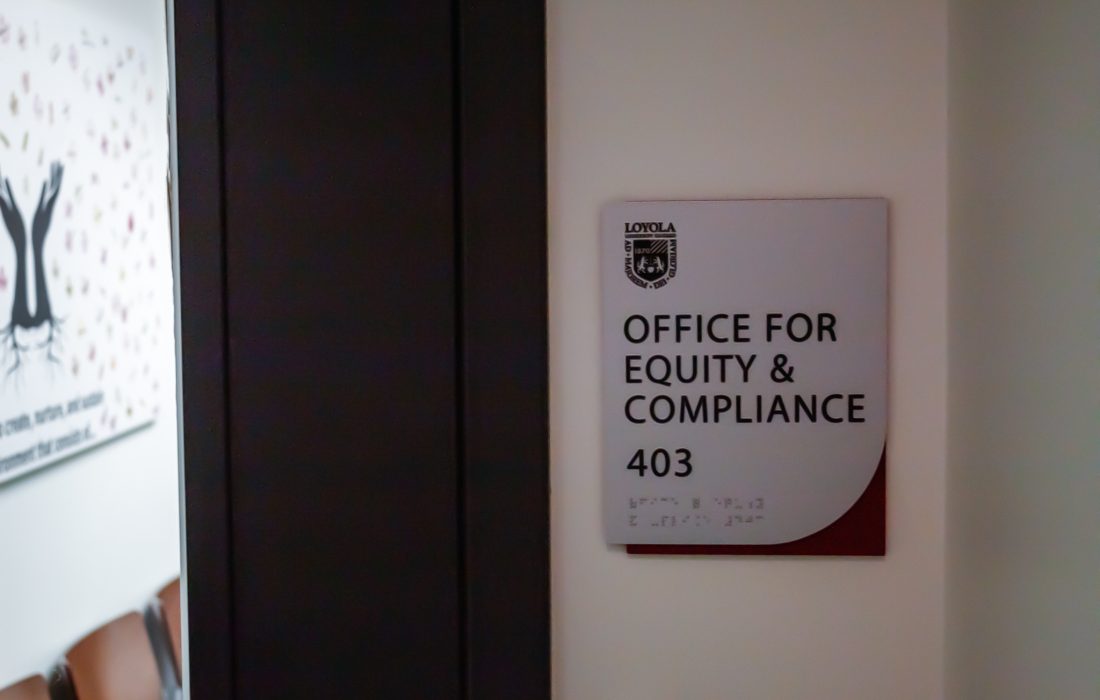Updated Title IX regulations cause changes to Loyola’s Comprehensive Policy, involving sexual harassment and discrimination.
New Title IX Regulations At Loyola Expand How The OEC Can Help The Loyola Community
New Title IX regulations put in place by the Department of Education under the Biden administration went into effect Aug. 1, prompting Loyola to update its Comprehensive Policy to reflect the new regulations. These involve discrimination on the basis of sexual orientation, gender identity and conditions like or related to pregnancy in addition to an updated definition of sexual harassment.
While the new regulations have been accepted in Illinois, and thereby at Loyola, lawsuits have blocked the new regulations from being enforced in over 25 states as well as in colleges and schools throughout the U.S., according to the Associated Press.
The Supreme Court rejected a challenge to the lawsuits, resulting in the new rules being on hold in states who have filed lawsuits, according to AP.
Tim Love, the executive director of the Office for Equity and Compliance (OEC) and Loyola’s Title IX coordinator, said the new rules don’t affect much of the university’s policies since Loyola has existing protections against discrimination on the basis of gender identity and sexual orientation through its own policies and Illinois state law.
New Definition Of Sexual Harassment
Under the new Title IX regulations, Love said Loyola was able to expand its definition of quid pro quo sexual harassment, which refers to an instance where something is exchanged for a sexual behavior. For example, Love explained, a student receiving an A on an assignment in exchange for sleeping with or going on a date with a professor would be classified as quid pro quo sexual harassment.
While quid pro quo sexual harassment was previously defined as occuring between two employees or between a student and an employee in power, such as a professor, the new regulations state a relationship between two students, in which one student has power over the other, could classify under quid pro quo sexual harrassment.
“So let’s say, you know, the president of a club says, ‘I’ll let you into my club if you sleep with me, or if you date me,’ or whatever,” Love said. “That could actually be quid pro quo sexual harassment under Title IX, whereas previously, it would have had to be an employee who was doing it.”
The definition of hostile environment sexual harassment was also updated, according to Love. Previously, it was defined as non-consensual action which was both severe and pervasive, but it has now changed to either severe or pervasive, which widens what could be classified sexual harassment.
The new language targets repeated behaviors such as micro-agressions, which previously weren’t “severe” enough to warrant a sexual harassment tag, Love said. It also allows students and faculty to report instances as sexual harassment after one incident.
“If it only happens one time, but it’s awful; it makes the person have to leave the class in tears or something crazy — that could be sexual harassment,” Love said. “Whereas in the past, it wouldn’t have been because it only happened once.”
OEC Changes From Hearings To Investigations
Love said the OEC also updated its procedures to be more victim-focused, specifically by removing hearings from their process since they are no longer required under Title IX.
Now, when an incident is reported — such as sexual assault, stalking, dating violence or domestic violence — an investigation is conducted by an attorney within the office, who will contact both parties, gather all evidence and make a decision.
Sam Hammett, a violence prevention and advocacy specialist at Loyola who supervises all student workers for “The Line,” said there’s been a lot of feedback indicating survivors don’t want to be in a hearing space, even virtually, with the person who has caused them harm.
The Line is a advocacy service which provides students resources and support if they have experienced sexual assault, dating or domestic violence, sexual harassment, sexual exploitation or stalking. The Line is also available to students who have questions or would like to talk to a trauma-informed advocate.
Hamment said from a survivor advocacy standpoint moving away from hearings is a move in the right direction for trauma-informed care.
While Hammett said she understands the fear surrounding whether the new Title IX regulations will be overturned in response to the nationwide lawsuits, she said The Line will always be there to support students and staff no matter the law.
“The line is not going to change who we support and how we support,” Hammett said. “That is the beauty of confidential advocacy. We do not exist because of Title IX. We exist because we want to support students who have experienced gender based violence in all of its forms.”
Protections Against Discrimination On The Basis Of Pregnancy
Title IX also has an entirely new set of protections for pregnancy and related conditions, such as pregnancy preparation including IVF, miscarriages or termination of pregnancy, postpartum and post-birth recovery, Love said.
“Students have very strong protections against discrimination based on pregnancy,” Love said “The university has an obligation to provide reasonable modifications to ensure that pregnant students can continue in their educational experience.”
Paige Gutierrez, a fourth-year marketing student and member of the RISE Ambassadors, a group of students who advise the OEC, said the lawsuits occurring throughout the country sadden her, and she wishes people could be accepted for normal human experiences, like pregnancy.
She said she’s grateful Loyola respects student identities and appreciates the policies the university had already enacted to make students feel safe and protected, so she doesn’t have to fear what could happen if the new Title IX regulations are reversed.
“I think that Loyola does a great job of making sure students feel heard and that they can kind of be who they want here,” Gutierrez said.
Jenna Phillips, a fourth-year economics and political science student who is also part of RISE Ambassadors, said it’s important Loyola students get to know the people behind the reporting process, including people from the OEC and the Wellness Center.
To help bridge the gap, Phillips said she planned an event last year where students could interact with OEC and Wellness Center staff. She said she hoped students could understand not only the technical processes of reporting, but she also wanted students to know why the people in the OEC do the work they do.
“People are doing this work because they want to do this work,” Phillips said. “Because they care about you as students.”
Phillips said she believes Title IX is the bare minimum of what should be done to protect students and the Loyola community, and she believes Loyola had already exceeded the expectations before the new regulations were enforced nationwide.
“I would want students to be assured that no matter what the law ends up being, every student is going to always be treated with dignity and respect,” Love said. “Every student is always going to have some rights. The technical wording of those rights might change year to year, but the university is not only guided by the law, which obviously we have to follow, but also by our ethical decisions and our values as an institution.”
-

Julia Pentasuglio is a second-year majoring in multimedia journalism and political science with a minor in environmental communication and is one of two Deputy News Editors for The Phoenix. Julia previously interned on the Digital Media team at North Coast Media, a business-to-business magazine company based in Cleveland, Ohio. She has also written freelance for The Akron Beacon Journal. Outside of her love for news and journalistic storytelling, Julia enjoys camping, biking, skiing and anything she can do outside.
View all posts
Topics
Get the Loyola Phoenix newsletter straight to your inbox!


